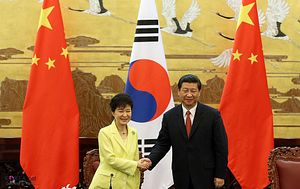It’s been a busy month so far for Chinese diplomats, with Beijing working hard to display its global leadership bona fides at three major meetings: the APEC summit in Beijing, ASEAN-related meetings (including the East Asia Summit) in Myanmar, and finally the G20 summit in Australia. A good portion of China’s agenda at these meetings was economic, and it paid off – Beijing has effectively concluded free trade agreements with both Australia and South Korea.
An FTA between Australia and China was a major priority for both governments, with the two sides setting a target of finalizing the deal in 2014. During Chinese President Xi Jinping’s time in Australia as part of the G20 summit, the two sides announced that they have effectively completed the negotiations.
On Monday, Xi and Australian Prime Minister Tony Abbott announced the “practical conclusion of bilateral FTA talks,” according to Xinhua. Xi called the FTA “a high-quality, high-level deal” that addresses both sides’ concerns. For Australia, the main concerns were removing or at least lowering Chinese barriers to foreign agricultural products as well as loosening restrictions on the service industry. China, meanwhile, wanted more freedom for Chinese companies to invest in Australia.
In the final deal, China agreed to phase out tariffs on dairy products, wines, and beer over the next four to 11 years. The Sydney Morning Herald described this as a win for Australia’s agricultural sector. China will also gradually remove tariffs on natural resources and energy products, as well as Australian pharmaceuticals. Australian service industries, from law firms to hotels and restaurants, will face fewer restrictions on setting up business within China. China also plans to set up a clearing back in Sydney to handle renminbi transactions and will allow a 50 billion RMB quota of investment for Australian financial institutions.
Meanwhile, privately-owned Chinese companies can now invest up to AU$1.08 billion (up from $248 million) in non-sensitive sectors without triggering an automatic review. In remarks with Xi, Abbott specifically welcomed Chinese investment in Australia’s resource extraction and infrastructure construction sectors.
As for the China-South Korea FTA, Presidents Xi Jinping and Park Geun-hye announced the completion of negotiations on Monday, November 10, on the sidelines of the APEC summit in Beijing. According to Xinhua, the FTA will eliminate tariffs on 90 percent of goods traded between China and South Korea over the next 20 years. The FTA will cover 17 sectors (including investment, the service industry, e-commerce and government purchases). Given that China is the destination for nearly a quarter of South Korean exports, HSBC estimates the deal could boost South Korea’s GDP by over 3 percent over time. China’s Assistant Commerce Minister Wang Shouwen told reporters that he expects the agreement to be formally signed next year and to take effect in the second half of 2015.
As with any FTA, there are also political considerations at work. As Xinhua pointed out, the China-South Korea FTA will put additional economic pressure on Japan to revitalize its relationship with both countries. A proposed trilateral FTA between China, Japan, and South Korea has been on mothballs since China-Japan relations soured in 2012. Now that China and South Korea have concluded their own, bilateral FTA, China hopes Japan will feel additional pressure to warm its relationship with Beijing.
The FTA is also a diplomatic victory for the China-South Korea bilateral relationship, just as the deal with Australia was a positive sign for Beijing-Canberra relations. Even as Xi and Abbott announced the finalization of the FTA, they also upgrade the China-Australia relationship to a “comprehensive strategic partnership,” a commitment to further their overall bilateral relationship. Yes, it will take more than economic deals to cement China’s strategic position in the Asia-Pacific – but the conclusion of two FTAs with major regional powers is undoubtedly a positive step both economically and strategically.

































